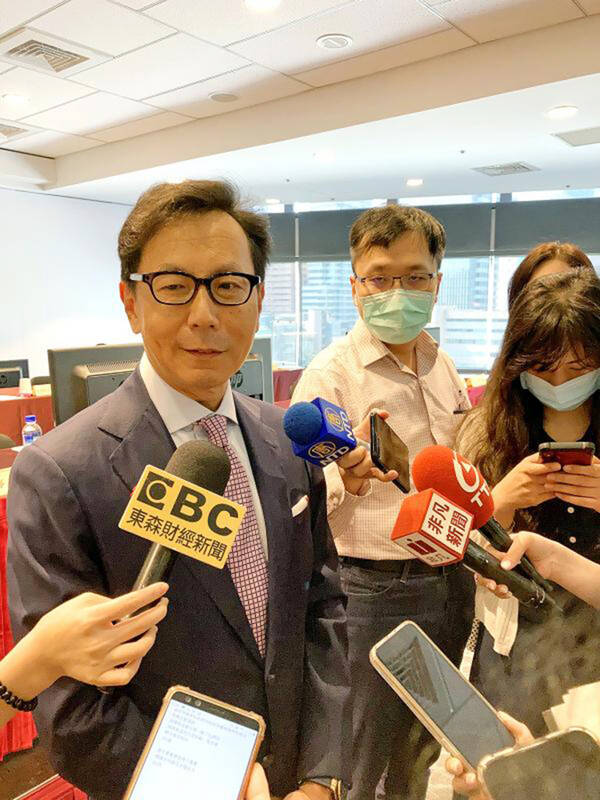Brothers Daniel Tsai (蔡明忠) and Richard Tsai (蔡明興), who run Fubon Group (富邦集團), took the top spot in Forbes magazine’s list of Taiwan’s 50 richest people this year, despite an 8 percent fall in their net worth.
The two brothers were among 22 of the top 50 billionaires in Taiwan who saw their net worth shrink, but they still rose two spots from last year to reclaim the No. 1 position after a five-year gap, the magazine said.
The wealth of the Tsai brothers shrank to US$8.8 billion as Fubon Financial Holding Co (富邦金控) took a hit from COVID-19 insurance claims, which pushed down the company’s earnings and share price last year, Forbes said.

Photo: Lisa Wang, Taipei Times
In addition to their financial empire, the Tsai family owns telecom Taiwan Mobile Co (台灣大哥大) and e-commerce platform momo.com Inc (富邦媒體).
After the Tsai brothers, the four Wei brothers — Wei Ing-chou (魏應州), Wei Ying-chiao (魏應交), Wei Ying-chun (魏應充) and Wei Ying-heng (魏應行) — who control food and beverage conglomerate Ting Hsin International Group (頂新集團), took second place with a net worth of US$8.3 billion, Forbes said.
Ting Hsin owns Master Kong, one of the largest instant noodle suppliers in China which reported record-high sales of US$11.4 billion last year, the magazine said.
Taking the No. 3 spot was Lin Shu-hong (林書鴻), cofounder of the petrochemical conglomerate Chang Chun Group (長春集團), who benefited from rising chemical prices and saw his wealth grow to US$7.9 billion.
Also affected by hefty COVID-19 insurance claims, the brothers Tsai Hong-tu (蔡宏圖) and Tsai Cheng-ta (蔡政達) of Cathay Financial Holding Co (國泰金控) fell to No. 4 this year from No. 2 a year earlier with a net worth of US$7.7 billion, Forbes said.
Falling from the top spot last year, low-key and self-made footwear tycoon Zhang Congyuan (張聰淵) took fifth spot in the latest list as his wealth contracted in US dollar terms by US$4.5 billion to US$7.6 billion.
Zhang’s wealth shrank as shares of his Guangdong-based Huali Industrial Group (華利實業集團), which is listed on the Shenzhen Stock Exchange, dropped due to decreased orders amid COVID-19 pandemic-induced disruptions.
Terry Gou (郭台銘), founder of the world’s largest contract electronics maker, Hon Hai Precision Industry Co (鴻海精密), came in sixth after his wealth rose to US$7.4 billion this year from US$6.8 billion.
Gou’s wealth largely comes from iPhone assembler Hon Hai, also known as Foxconn (富士康) globally, whose sales rose 11 percent from a year earlier to US$217 billion last year.
The Chang brothers — Jason Chang (張虔生) and Richard Chang (張洪本), who are chairman and vice chairman of chip packaging and testing services provider ASE Technology Holding Co (日月光投控) respectively, took seventh place with a net worth of US$6.3 billion, ahead of chairman of snack and beverage brand Want Want Group’s (旺旺集團) Tsai Eng-meng (蔡衍明), with US$6.1 billion in net worth.
Tsai was followed by Barry Lam (林百里), chairman of contract notebook computer maker Quanta Computer Inc (廣達電腦), with US$5.6 billion, and chairman of electronics component maker Yageo Corp (國巨) Pierre Chen (陳泰銘), with US$5.5 billion.

Taiwan Semiconductor Manufacturing Co (TSMC, 台積電) last week recorded an increase in the number of shareholders to the highest in almost eight months, despite its share price falling 3.38 percent from the previous week, Taiwan Stock Exchange data released on Saturday showed. As of Friday, TSMC had 1.88 million shareholders, the most since the week of April 25 and an increase of 31,870 from the previous week, the data showed. The number of shareholders jumped despite a drop of NT$50 (US$1.59), or 3.38 percent, in TSMC’s share price from a week earlier to NT$1,430, as investors took profits from their earlier gains

In a high-security Shenzhen laboratory, Chinese scientists have built what Washington has spent years trying to prevent: a prototype of a machine capable of producing the cutting-edge semiconductor chips that power artificial intelligence (AI), smartphones and weapons central to Western military dominance, Reuters has learned. Completed early this year and undergoing testing, the prototype fills nearly an entire factory floor. It was built by a team of former engineers from Dutch semiconductor giant ASML who reverse-engineered the company’s extreme ultraviolet lithography (EUV) machines, according to two people with knowledge of the project. EUV machines sit at the heart of a technological Cold

Taiwan’s long-term economic competitiveness will hinge not only on national champions like Taiwan Semiconductor Manufacturing Co. (TSMC, 台積電) but also on the widespread adoption of artificial intelligence (AI) and other emerging technologies, a US-based scholar has said. At a lecture in Taipei on Tuesday, Jeffrey Ding, assistant professor of political science at the George Washington University and author of "Technology and the Rise of Great Powers," argued that historical experience shows that general-purpose technologies (GPTs) — such as electricity, computers and now AI — shape long-term economic advantages through their diffusion across the broader economy. "What really matters is not who pioneers

TAIWAN VALUE CHAIN: Foxtron is to fully own Luxgen following the transaction and it plans to launch a new electric model, the Foxtron Bria, in Taiwan next year Yulon Motor Co (裕隆汽車) yesterday said that its board of directors approved the disposal of its electric vehicle (EV) unit, Luxgen Motor Co (納智捷汽車), to Foxtron Vehicle Technologies Co (鴻華先進) for NT$787.6 million (US$24.98 million). Foxtron, a half-half joint venture between Yulon affiliate Hua-Chuang Automobile Information Technical Center Co (華創車電) and Hon Hai Precision Industry Co (鴻海精密), expects to wrap up the deal in the first quarter of next year. Foxtron would fully own Luxgen following the transaction, including five car distributing companies, outlets and all employees. The deal is subject to the approval of the Fair Trade Commission, Foxtron said. “Foxtron will be